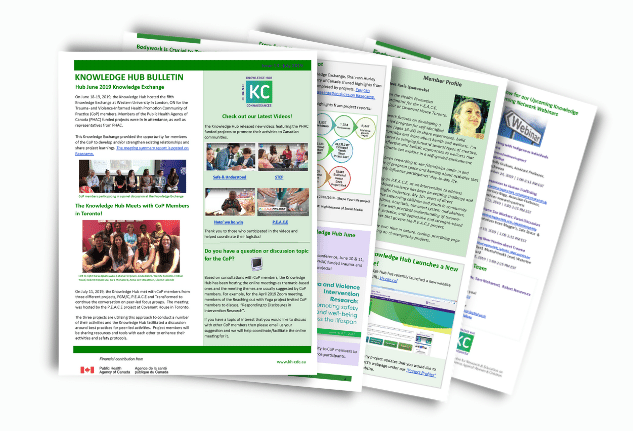Bulletin 13 July 2019

Hub June 2019 Knowledge Exchange
On June 18-19, 2019, the Knowledge Hub hosted the fifth Knowledge Exchange at Western University in London, ON for the Trauma- and Violence-Informed Health Promotion Community of Practice (CoP) members. Members of the Public Health Agency of Canada (PHAC) funded projects were in in attendance, as well as representatives from PHAC.
This Knowledge Exchange provided the opportunity for members of the CoP to develop and/or strengthen existing relationships and share project learnings. The meeting summary report is posted on Basecamp.
The Knowledge Hub Meets with CoP Members in Toronto!
On July 11, 2019, the Knowledge Hub met with CoP members from three different projects, FGM/C, P.E.A.C.E and TransFormed to continue the conversation on peer-led focus groups. The meeting was hosted by the P.E.A.C.E project at Covenant House in Toronto. The three projects are utilizing this approach to conduct a number of their activities and the Knowledge Hub facilitated a discussion around best practices for peer-led activities. Project members will be sharing resources and tools with each other to enhance their activities and safety protocols.
Bodywork is Crucial to Trauma Work!
Shape Your Life (SYL) is a free, trauma-informed, non-contact boxing program for self-identified women who have experienced violence. It began in 2007 and received funding from PHAC in 2015 to continue the program and to measure its effects on the mental and physical health outcomes of participants.
The evaluation of the program was concluded in March 2018. Dr. Cathy Van Ingen provided an overview of the research findings at the June 2019 Knowledge Exchange.
Data was collected from participants at three phases, baseline, mid, and post program. Significant increases occurred as early as 8 weeks into the program in the following areas:
- Self-esteem/confidence
- Personal and interpersonal agency
- Mental health
- Physical, psychological, social and environmental quality of life
Resilience and perceived physical ability also improved from the 8th week to the 16th week.
…boxing is the place that I come because I need to step into a place where my body remembers that I’m strong, where my body remembers that I’m in a different place and time – SYL Participant
From Feasibility to Effectiveness: Building the evaluation of MindUP
The MindUP for Young Children project is implementing and evaluating a mindfulness-informed evidence-based social and emotional learning intervention within a trauma-informed framework to full-day kindergarten children in the London District Catholc School Board and a community-based organization, Merrymount Family Support and Crisis Centre.
Dr. CLaire Crooks discussed the importance of conducting feasibility studies before implementing an intervention at the June 2019 Knowledge exchange.
The feasibility study was conducted based on Bowen & colleagues' framework (2009). It showed high rates of acceptability and reported engagement with MindUP curriculum. It also demonstrated positive impacts on the students and that the program fits strongly within a trauma-informed framework. The pilot study also showed that the program had benefits not only for the students but for the educators as well.
MindUP's evaluation (2017-2018) showed significant decrease in behavioural symptoms for students in intervention classrooms relative to comparative classrooms.
“I feel I am more mindful and aware of student's emotional states and able to relate behaviours back to the brain more often.” - MindUP Teacher
Key Areas of Focus for Feasibility Studies
| Area | Description | Indicators |
| Acceptability | To what extent is a new idea, program, approach or measure judged as suitable, satisfying, or attractive to program deliverers? To program participants? |
Satisfaction Intent to continue use Perceived appropriatenedd Fit with organizational culture |
| Demand | To what extent is a new idea, program, approach, or measure likely to be used? |
Actual use Expressed interest or intention to use Perceived demand |
| Implementation | To what extent is a new program, idea, approach or measure succeefully delivered to participants in a defined, but not fully controlled context? |
Degree of execution Successes and challenges Supports and resources required |
